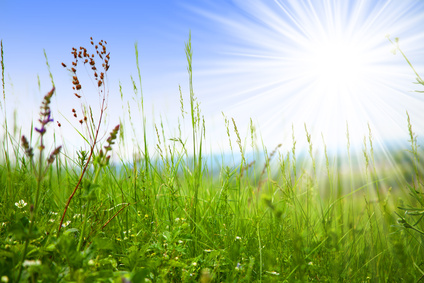
Many of us are eager to see the sunshine appearing through the dark clouds of winter. It’s a welcome break when the bulbs start to sprout and once again, the ground is covered in wonderful vibrant flowers, and the blossom starts to appear on the trees. However, for those who suffer from Hayfever, Spring and Summer are accompanied by the dread of sneezing, itchy and watery eyes and that awful feeling of congestion.
Hayfever is caused by the body’s immune system reacting abnormally to the pollen in grass, certain types of plants and trees. Some weather conditions make it worse as the pollen is held or carried through the air. The body produces antibodies to pollen which triggers histamine release causing the uncomfortable symptoms.
A Medical Herbalist’s approach to Hayfever is to treat the ‘whole’ person with extra focus on the immune system. So, rather than attacking the histamine release alone, the issue of why the body is reacting abnormally is the primary concern. There may be considerations such as diet, family history and other medical conditions – past and present, to take into account. The most successful Hayfever treatment is started early, so the body is prepared in advance of the ‘Hayfever Season.’
Some herbs can be useful in many cases of Hayfever. Both Urtica dioica (Stinging Nettle) and Chamomilla recutita (German Chamomile) have anti-allergic and anti-inflammatory properties – supporting the immune system and relieving inflammation in the eyes and nose. Euphrasia officinalis (Eyebright) relieves eye inflammation and attacks the liquid mucus often accompanying Hayfever. Sambucus nigra (Elder) flowers have anti-allergic, anti-catarrhal and anti-inflammatory properties. Plantago lanceolata (Ribwort Plantain) is a wonderful herb for hayfever, it gently supports and restores health to the mucous membranes of the upper respiratory tract.
Other allergies may contribute to the development and symptoms of hayfever. It’s possible there are unidentified intolerances making the hayfever worse. It’s often useful to have an allergy test to identify other sensitivities. If those are addressed on many occasions the hayfever symptoms improve.
For further information regarding Hayfever, or any other aspect of your health and how herbs may help then please contact me.
Lynda Jones BSc (Hons) Medical Herbalist
I have had hayfever for past 20 years
I’m now 70 and my hayfever is worse than ever it mainly affects my eyes – swollen itchy upper and lower lids.
Sneezing and being congested doesn’t worry me but my eyes are unbearable
It begins early February. Ok for a few weeks then takes off with a vengeance late Feb until end May – after that I just have rhinitis which isn’t a problem!
Hi Elaine, sorry for the late response. If you still require assistance can you please email me on jones.lynda@yahoo.co.uk where I can answer this properly :). Thank you x